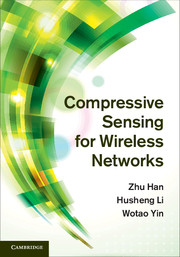1 - Introduction
Published online by Cambridge University Press: 05 June 2013
Summary
Sampling is not only a beautiful research topic with an interesting history, but also a subject with high practical impact, at the heart of signal processing and communications and their applications. Conventional approaches to sample signals or images follow Shannon's celebrated theorem: the sampling rate must be at least twice the maximum frequency present in the signal (the so-called Nyquist rate) has been to some extent accepted and widely used ever since the sampling theorem was implied by the work of Harry Nyquist in 1928 (“Certain topics in telegraph transmission theory”) and was proved by Claude E. Shannon in 1949 (“Communication in the presence of noise”). However, with the increasing demand for higher resolutions and an increasing number of modalities, the traditional signal-processing hardware and software are facing significant challenges. This is especially true for wireless communications.
The compressive sensing (CS) theory is a new technology emerging in the interdisciplinary area of signal processing, statistics, optimization, as well as many application areas including wireless communications. By utilizing the fact that a signal is sparse or compressible in some transform domain, CS can acquire a signal from a small set of incoherent measurements with a sampling rate much lower than the Nyquist rate. As more and more experimental evidence suggests that many kinds of signals in wireless applications are sparse, CS has become an important component in the design of next-generation wireless networks.
Information
- Type
- Chapter
- Information
- Compressive Sensing for Wireless Networks , pp. 1 - 5Publisher: Cambridge University PressPrint publication year: 2013
